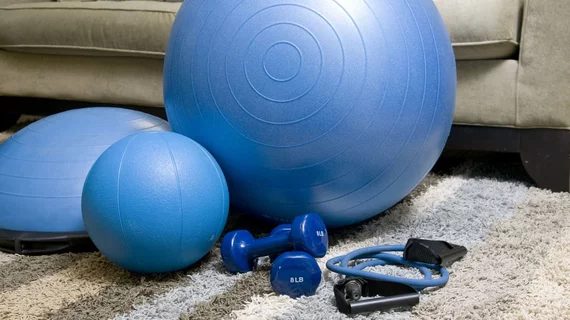Following total hip replacement, patients are well-served with AI-powered biofeedback that helps them rehab safely and effectively at home with occasional monitoring by a remote physical therapist.
So found researchers in Portugal who compared clinical outcomes achieved with their novel AI system against outcomes following conventionally supervised in-home physical therapy (PT) regimens.
Lead author Fernando Dias Correia, MD, of Santo António General Hospital in Porto and colleagues had their proof-of-concept findings published online June 21 in JMIR Rehabilitation and Assistive Technologies.
The team assessed 66 patients prior to surgery to establish baseline, then did so again in the middle of rehab and at its end, as well as at three months and six months post-total hip replacement (aka arthroplasty). They split the participants into two cohorts, 31 in conventional PT and 35 in digital PT.
The latter were guided in exercise sessions over a mobile app, which they were instructed to use five to seven days per week.
Those who didn’t keep up weren’t excluded from the study, as the researchers wanted to gauge patients’ willingness as well as their physical progress.
Analyzing the results, they found clinically relevant improvements in both groups at all time points.
Meanwhile the digital group had better timed “up and go” scores as well as on two key outcomes analyses (per-protocol and intention-to-treat).
Additionally, between baseline and the six-month point, results were better in the digital group for hip dysfunction and quality of life (the latter with one exception, standing flexion).
“This study demonstrates this novel solution holds promise in rehabilitation after total hip arthroplasty, ensuring better clinical outcomes than conventional rehabilitation while reducing dependence on human resources,” Dias Correia et al. concluded.
In their discussion, the authors note that they started with 156 eligible study subjects. The main reasons the field whittled to 66 were simple refusals and withdrawals of consent.
The authors cite skepticism of technology, especially in an older subpopulation like one needing hip replacements, as a likely source of the falloff.
“This same difficulty was reported by other authors in studies with similar devices and is one of the challenges that these technologies need to overcome,” they write. Meanwhile the oldest patients in the present study expressed fears of hidden costs “even though it was clearly and thoroughly explained that participation in the study did not imply any cost.”
Dias Correia and co-authors comment that their study demonstrates the safety and feasibility of a novel AI-aided biofeedback system following total hip replacement—as previously demonstrated by the same team for total knee arthroplasty.
The system “is associated with high patient satisfaction, albeit with room for improvement in terms of usability by elderly patients,” they write. “These promising results justify further investigation and prove the feasibility of larger randomized controlled trials to confirm these findings.”

